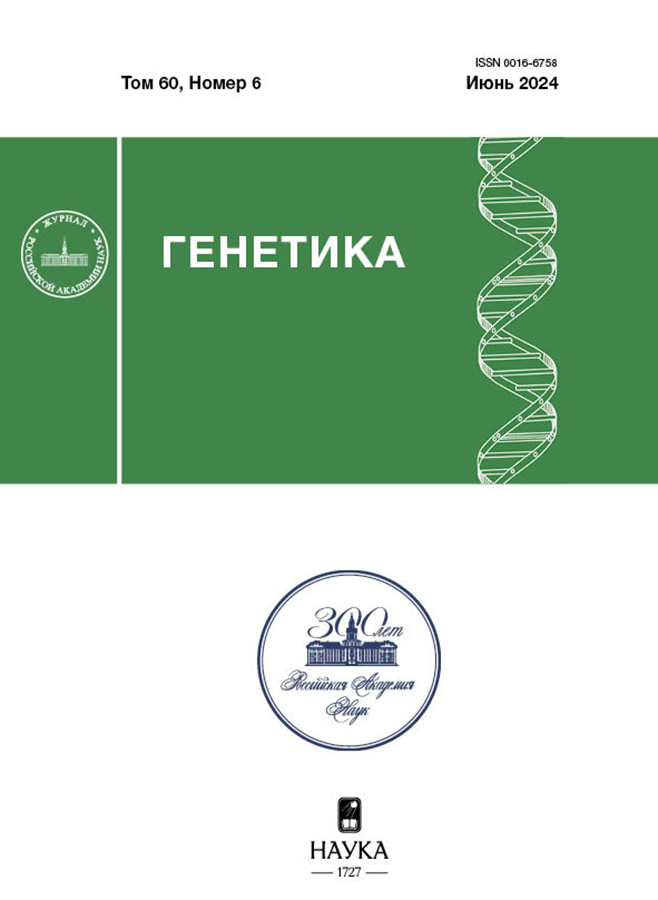Assessing the Genetic Diversity of Five Cattle Breeds Using SNP Markers Associated with Health
- 作者: Bytov M.V.1, Zubareva V.D.1, Volskaya S.V.1, Isaeva A.G.1, Nokhrin D.Y.1, Osipova Y.A.1, Sokolova O.V.1
-
隶属关系:
- Ural Federal Agrarian Scientific Research Centre, Ural Branch of Russian Academy of Sciences
- 期: 卷 60, 编号 6 (2024)
- 页面: 55-61
- 栏目: ГЕНЕТИКА ЖИВОТНЫХ
- URL: https://rjpbr.com/0016-6758/article/view/667248
- DOI: https://doi.org/10.31857/S0016675824060056
- EDN: https://elibrary.ru/BXVTWP
- ID: 667248
如何引用文章
详细
Currently genetic evaluation of animals is an important part of the development of the agricultural complex. The improvement of molecular technologies every year makes it possible to carry out genetic research aimed at finding the most valuable animals in a cheaper and faster way. Indigenous breeds of cattle are an attractive object for such research because they have greater adaptive potential and resistance to diseases. However, modern comparative data on the genetic diversity of most local breeds based on SNP markers associated with health are lacking. Genetic association tests using these genetic markers for the Tagil, Sychevskaya, Suksun and Istobenskaya breeds are still to be carried out. The purpose of this work was to compare the genetic diversity of five cattle breeds using SNP markers associated with the development of ketosis, mastitis and productive longevity.
全文:
作者简介
M. Bytov
Ural Federal Agrarian Scientific Research Centre, Ural Branch of Russian Academy of Sciences
Email: nauka_sokolova@mail.ru
俄罗斯联邦, Ekaterinburg, 620142
V. Zubareva
Ural Federal Agrarian Scientific Research Centre, Ural Branch of Russian Academy of Sciences
Email: nauka_sokolova@mail.ru
俄罗斯联邦, Ekaterinburg, 620142
S. Volskaya
Ural Federal Agrarian Scientific Research Centre, Ural Branch of Russian Academy of Sciences
Email: nauka_sokolova@mail.ru
俄罗斯联邦, Ekaterinburg, 620142
A. Isaeva
Ural Federal Agrarian Scientific Research Centre, Ural Branch of Russian Academy of Sciences
Email: nauka_sokolova@mail.ru
俄罗斯联邦, Ekaterinburg, 620142
D. Nokhrin
Ural Federal Agrarian Scientific Research Centre, Ural Branch of Russian Academy of Sciences
Email: nauka_sokolova@mail.ru
俄罗斯联邦, Ekaterinburg, 620142
Yu. Osipova
Ural Federal Agrarian Scientific Research Centre, Ural Branch of Russian Academy of Sciences
Email: nauka_sokolova@mail.ru
俄罗斯联邦, Ekaterinburg, 620142
O. Sokolova
Ural Federal Agrarian Scientific Research Centre, Ural Branch of Russian Academy of Sciences
编辑信件的主要联系方式.
Email: nauka_sokolova@mail.ru
俄罗斯联邦, Ekaterinburg, 620142
参考
- Модоров М.В., Ткаченко И.В., Грин А.А. и др. Генетическая структура популяции голштинизированного черно-пестрого скота на территории Урала // Генетика. 2021. Т. 57. № 4. С. 437−444. https://doi.org/10.31857/S001667582104010X.
- Юдин Н.С., Ларкин Д.М.. Происхождение, селекция и адаптация российских пород крупного рогатого скота по данным полногеномных исследований // Вавиловский журн. генетики и селекции. 2019. Т. 23. № 5. С 559−568. https://doi.org/10.18699/VJ19.525
- Породы крупного рогатого скота: справочник / Сост. Иванова Н.В., Максимов А.Г. Перси-ановский: Донской ГАУ, 2019. 143 с. URL: https://e.lanbook.com/book/148559
- Фетисова Л.В. Создание и совершенствование сычевской породы крупного рогатого скота. Смоленск: Смоленское кн. изд-во, 1959. 163 с.
- The State of the World’s Animal Genetic Resources for Food and Agriculture / Eds Rischkowsky B., Pilling D. FAO, 2007. 524 с.
- Информационная система по разнообразию домашних животных (ИС-РДЖ). [Электронный ресурс] // URL: https://www.fao.org/dad-is/browse-by-country-and-species/ru/ (дата обращения: 10.11.2023).
- Столповский Ю.А., Бекетов С.В., Солоднева Е.В. и др. Генетическая структура аборигенного тагильского скота по STR- и SNP-маркерам // С.-х. биология. 2021. Т. 56. № 6. С. 1111−1122. https://doi.org/10.15389/agrobiology.2021.6.1123rus.
- Nayeri S., Schenkel F., Fleming A. et al. Genome-wide association analysis for β-hydroxybutyrate concentration in Milk in Holstein dairy cattle // BMC Genetics. 2019. V. 20. № 58. P. 1−17. https://doi.org/10.1186/s12863-019-0761-9.
- Horst R.L., Goff J.P., Reinhardt T.A. Calcium and vitamin D metabolism during lactation // J. Mammary Gland Biol. Neoplasia. 1997. V. 2. P. 253–263. https://doi.org/10.1023/A:1026384421273.
- Nayeri S., Sargolzaei M., Abo-Ismail M.K. et al. Genome-wide association study for lactation persistency, female fertility, longevity, and lifetime profit index traits in Holstein dairy cattle // J. Dairy Science. 2017. V. 100. № 2. P. 1246−1258. https://doi.org/10.3168/jds.2016-11770
- Бытов М.В., Соколова О.В., Безбородова Н.А. и др. Методы генотипирования крупного рогатого скота для post-GWAS аннотирования SNPs // Аграрный вестник Урала. 2023. № 06 (235). С. 67‒75. https://doi.org/10.32417/1997-4868-2023-235-06-67-75
- Haberman S.J. The analysis of residuals in cross-classified tables // Biometrics. 1973. V. 29. № 1. P. 205−220. https://doi.org/10.2307/2529686
- Hammer Ø., Harper D.A.T., Ryan P.D. PAST: Paleontological Statistics software package for education and data analysis // Palaeontologia Electronica. 2001. V. 4. № 1. P. 1−9.
- Santos F.A.B., Lemes R.B., Otto P.A. HW_TEST, a program for comprehensive Hardy−Weinberg equilibrium testing // Genet. Mol. Biol. 2020. V. 43. № 2. https://doi.org/10.1590/1678-4685-GMB-2019-0380
- Henschke H. De Finetti diagram. [Электронный ресурс] // URL: https://web.archive.org/web/20110719103301/https://finetti.meb.unibonn.de/downloads/finetti_3.0.5_windows.zip (дата обращения: 1.11.2023).
- Peakall R., Smouse P.E. Genalex 6: Genetic analysis in Excel. Population genetic software for teaching and research // Mol. Ecol. Notes. 2006. V. 6. № 1. P. 288−295. https://doi.org/10.1111/j.1471-8286.2005.01155.x
- Tang D., Chen M., Huang X. et al. SRplot: A free online platform for data visualization and graphing // PLoS One. 2023. V. 18. № 11. P. 1−8. https://doi.org/10.1371/journal.pone.0294236
- Chen B., Cole J.W., Grond-Ginsbach C. Departure from Hardy−Weinberg equilibrium and genotyping error // Front. Genet. 2017. V. 8. № 167. P. 1−6. https://doi.org/10.3389/fgene.2017.00167
- Abramovs N., Brass A., Tassabehji M. Hardy−Weinberg equilibrium in the large scale genomic sequencing era // Front. Genet. 2020. V. 11. № 210. P. 1−11. https://doi.org/10.3389/fgene.2020.00210
- Ye J., Coulouris G., Zaretskaya I. et al. Primer-BLAST: A tool to design target-specific primers for polymerase chain reaction // BMC Bioinformatics. 2012. V. 13. № 134. P. 1−11. https://doi.org/10.1186/1471-2105-13-134
- Шевелёва О.М., Бахарев А.А., Терещенко И.Я. Экстерьерные особенности крупного рогатого скота мясных пород в условиях Северного Зауралья // Животноводство и кормопроизводство. 2023. Т. 106. № 3. С. 35-45.
- Зиновьева Н.А., Доцев А.В., Сермягин А.А. и др. Изучение генетического разнообразия и популяционной структуры российских пород крупного рогатого скота с использованием полногеномного анализа SNP // С.-х. биология. 2016. Т. 51. № 6. С. 788−800. https://doi.org/10.15389 agrobiology.2016.6.788rus
补充文件














